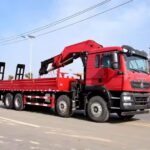When it comes to heavy-duty towing і recovery operationс, versatility and efficiency are paramount. In the world of specialized vehicles designed to handle the toughest tasks on the road, crane tow trucks stand out as true workhorses. These robust machines offer a unique blend of lifting and towing capabilities, making them indispensable assets in the world of transportation, construction, and emergency response. У цій статті, we delve into the fascinating world of crane tow truckс, exploring their features, applications, and the crucial role they play in various industries.
The Powerhouse of Versatility
Imagine a scenario where a semi-truck has careened off the highway, blocking traffic and potentially causing a hazardous spill. А traditional евакуатор might not suffice in such situations due to the weight and complexity of the recovery operation. This is where crane tow trucks shine. These vehicles combine the capabilities of both a heavy-duty tow truck and a mobile crane, offering a dynamic solution for a wide range of challenging situations.
1. Lifting Power: One of the standout features of crane tow trucks is their impressive lifting capacity. Equipped with a powerful hydraulic crane, these vehicles can hoist and move heavy objects with ease. This capability is invaluable in scenarios like recovering overturned truckс, relocating construction equipment, or even setting up large structures.
2. Towing Expertise: In addition to their lifting prowess, crane tow trucks maintain the traditional function of towing. With heavy-duty winches і specialized attachmentс, they can tow disabled vehicles, trailers, or even entire fleets efficiently. This dual functionality streamlines operations, saving time and resources.
3. Telescopic Reach: Crane tow trucks are designed with telescopic booms that can extend to impressive heights. This feature allows them to reach objects or vehicles in challenging locations, such as deep ditches, elevated bridges, or remote construction sites. The ability to access these difficult-to-reach areas is a game-changer in emergency response and recovery missions.

Applications Across Industries
The versatility of crane tow trucks makes them indispensable in various industries, each benefiting from their unique capabilities.
1. Transportation and Logistics: In the world of shipping and transportation, crane tow trucks are essential for handling breakdowns and accidents involving oversized trucks and cargo. They can swiftly clear the road, minimizing disruptions and ensuring the smooth flow of goods.
2. Construction: Construction sites often require the relocation of heavy equipment and materials. Crane tow trucks can move machinery efficiently like excavators and bulldozers, making them instrumental in construction projects.
3. Emergency Services: Fire departments, police departments, and emergency response teams rely on crane tow trucks to manage accidents involving large vehicles, especially hazardous materials carriers. The ability to lift and move these vehicles safely is crucial for mitigating risks.
4. Utility Services: When power lines are damaged due to accidents or natural disasterс, crane tow trucks can lift utility poles and equipment quickly into place, restoring essential services like electricity and communication networks.
5. Manufacturing: Crane tow trucks play a pivotal role in manufacturing plants by facilitating the movement of heavy machinery and materials, and optimizing production processes.
6. Municipal Services: Local governments use crane tow trucks for various tasks, from clearing storm debris to relocating public infrastructure.

Safety and Precision
The dual functionality of crane tow trucks is not just about power; it’s also about precision. These vehicles are equipped with advanced controls and safety features to ensure that lifting and towing operations are carried out with utmost precision and safety.
1. Stabilization Systems: Crane tow trucks are designed with stabilizer legs or outriggers that provide stability during lifting and towing operations. These systems prevent tipping and ensure safe lifting even in uneven terrain.
2. Load Monitoring: Most modern crane tow trucks are equipped with load monitoring systems that provide real-time data on the weight being lifted. This information helps operators make informed decisions and prevents overloading, which can be dangerous.
3. Operator Training: Operating a crane tow truck requires specialized training and certification. Operators must have a deep understanding of the equipment, load dynamics, and safety procedures to ensure smooth and safe operations.
4. Emergency Shut-Offs: In case of any unforeseen issues or emergencies, crane tow trucks are equipped with emergency shut-off systems that allow operators to quickly stop all crane movements, ensuring the safety of personnel and property.

The Environmental Factor
In today’s world, environmental concerns are at the forefront of many industries. Crane tow trucks are not exempt from these considerations. Manufacturers have taken steps to improve the environmental impact of these vehicles.
1. Fuel Efficiency: багато crane tow truck models are designed to be more fuel-efficient, reducing their carbon footprint during operation.
2. Emission Standards: Manufacturers adhere to stringent emission standardс, ensuring that crane tow trucks are compliant with environmental regulations.
3. Hybrid and Electric Options: Some manufacturers have introduced hybrid and electric crane tow truckс, further reducing their environmental impact and reliance on fossil fuels.
Challenges and Future Innovations
Despite their many advantages, crane tow trucks also face challenges. One significant issue is the cost of acquisition and maintenance, which can be substantial due to the complex machinery and safety features involved. Додатково, the specialized nature of these vehicles means that finding qualified operators and technicians can be a challenge.
Проте, the industry continues to evolve, and innovations are on the horizon. Advances in materials, technology, and automation are expected to enhance the capabilities and efficiency of crane tow truckс. Наприклад, remote operation and autonomous features may become more common, reducing the need for operators to be physically present in the vehicle. This can enhance safety and efficiency while potentially addressing the shortage of skilled operators.

Висновок
Crane tow trucks are true marvels of engineering, seamlessly blending the power of a crane with the towing capabilities of a heavy-duty truck. Their versatility and precision make them invaluable in a wide range of industries, from transportation and construction to emergency services and manufacturing. As these vehicles continue to evolve, they will undoubtedly play an even more significant role in shaping the way we handle heavy lifting and towing operations. With an eye on environmental concerns and safety, the future of crane tow trucks looks promising, promising a brighter, more efficient, and safer future for industries that rely on their unique capabilities.









